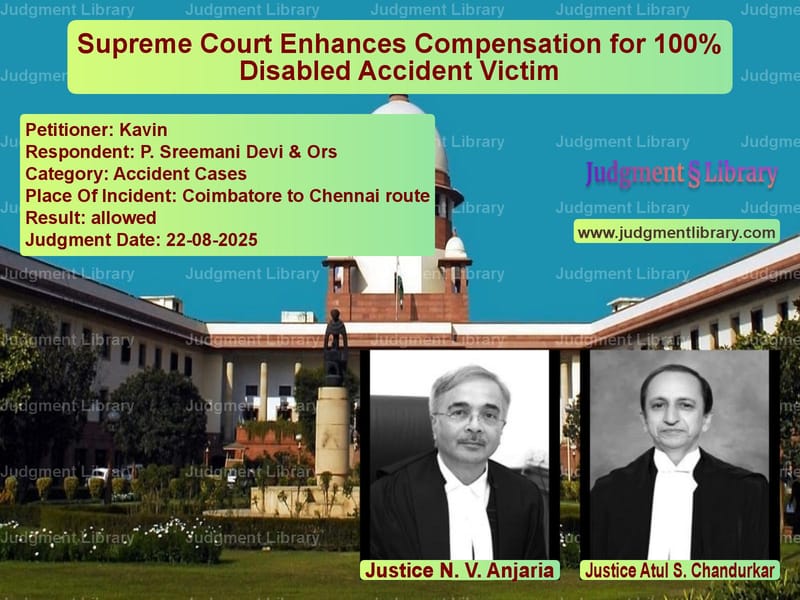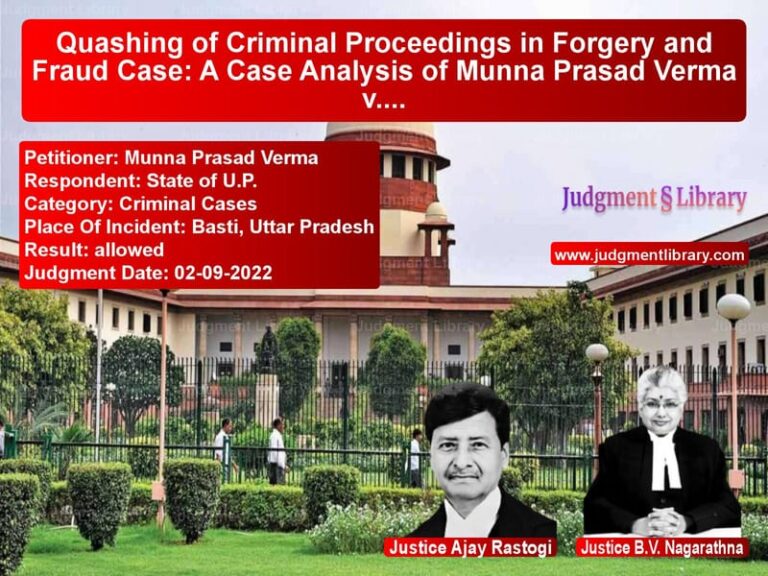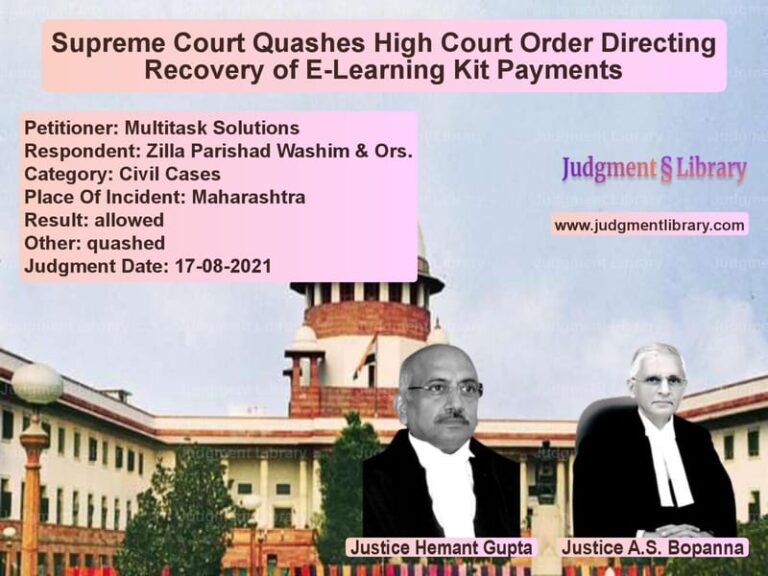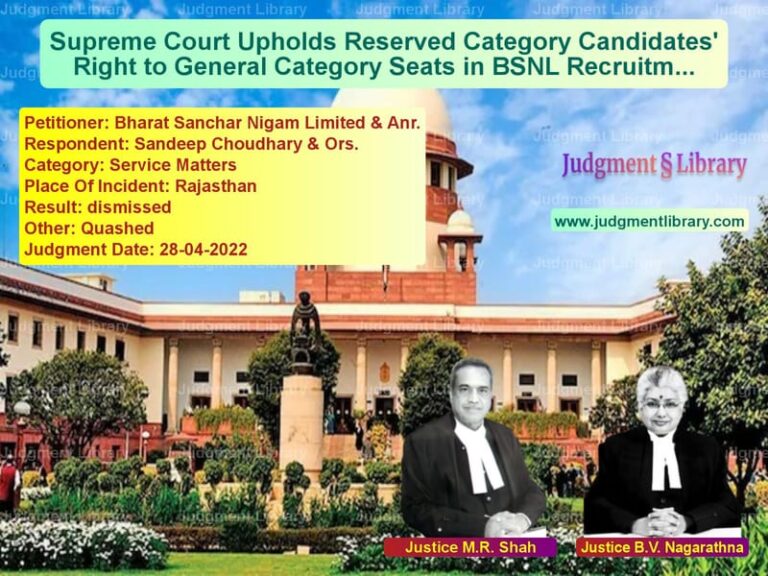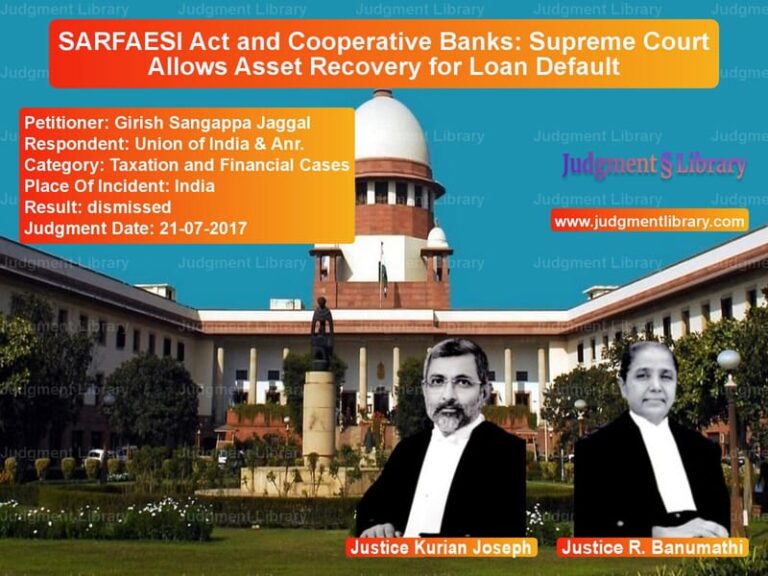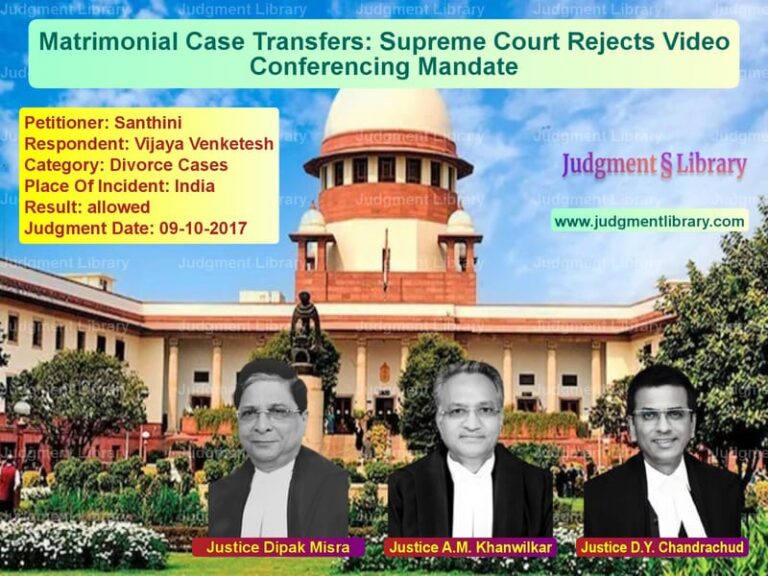Supreme Court Enhances Compensation for 100% Disabled Accident Victim
A young man’s life changed forever on the night of July 3, 2011, when the Omni bus he was travelling in from Coimbatore to Chennai crashed into a tamarind tree. Kavin, then just 21 years old and pursuing his degree in Arts, suffered catastrophic injuries that left him with 100% permanent disability. What followed was a 14-year legal battle for adequate compensation that ultimately reached the Supreme Court of India, resulting in a landmark judgment that significantly enhanced the compensation awarded to the severely disabled victim.
The legal journey began when Kavin filed M.C.O.P. No.962 of 2011 seeking compensation of Rs. 1 crore under Section 166 of the Motor Vehicles Act, 1988. The Motor Accidents Claims Tribunal, after considering the evidence, awarded him Rs. 67,83,866/- as compensation. However, both Kavin and the insurance company appealed this decision – Kavin sought enhancement while the insurance company challenged the quantum. The Madras High Court reduced the compensation by Rs. 19 lakhs, bringing it down to Rs. 48,83,866/-. This reduction prompted Kavin to approach the Supreme Court.
The Claimant’s Arguments
Ms. Harsha Tripathi, learned counsel appearing for the claimant submitted that the High Court was not justified in reducing the amount of compensation by Rs. 19 lacs. There was no justification whatsoever to hold that the evidence on record was insufficient to support the claim for future medical expenses. As the claimant had suffered 100% permanent disability it was obvious that he would be required to undertake medical treatment for his entire life. There was no justification for the High Court to have reduced the amount of compensation under these heads. In fact, the High Court ought to have awarded a higher amount than that granted by the Claims Tribunal.
The learned counsel further submitted that the amount of Rs. 3 lacs granted towards permanent disability came to be set aside by the High Court without any justifiable reason. Merely because compensation was granted towards loss of income, the same would not justify non-grant of compensation for permanent disability. Similarly, there was no legal basis for setting aside the amount of compensation granted towards loss of enjoyment of life and amenities as well as pain and suffering of family members.
Relying upon the decision of this Court in K.S. Muralidhar v. R. Subbulakshmi and another, 2024 INSC 886, it was submitted that the claimant as well as his family members were entitled to be granted compensation under the head “family pain and sufferings.” In fact, the amount of Rs. 3 lacs as granted by the Claims Tribunal was on a lower side. The High Court was also not justified in reducing the compensation that was granted by the Claims Tribunal towards attendant charges. In the light of injuries suffered by the claimant resulting in permanent disability, it was obvious that the claimant would require the services of an attendant for his entire life.
The Insurance Company’s Defense
On the other hand, Ms. Prema Mehta, learned counsel appearing for the insurance company supported the impugned judgment and opposed the prayer made by the claimant. It was submitted that the High Court rightly found that as the claim for compensation towards loss of income had been granted there was no justification for granting a sum of Rs. 3 lacs towards permanent disability. As the claimant failed to lead any evidence in respect of future medical expenses, the amount of Rs. 9 lacs as awarded by the Claims Tribunal was rightly reduced to Rs. 2 lacs.
Same was the case with regard to compensation towards attendant charges. There was no basis whatsoever for granting the amount of Rs. 6 lacs as awarded by the Claims Tribunal. The reasons for setting aside the compensation towards pain and suffering of the family members were also correct and the same did not call for any interference. In any event, it was submitted that considering the nature of evidence brought on record by the claimant, the High Court was justified in reducing the amount of compensation from that which was granted by the Claims Tribunal.
Supreme Court’s Analysis and Reasoning
The Supreme Court bench comprising Justices N.V. Anjaria and Atul S. Chandurkar delivered a comprehensive judgment that systematically addressed each head of compensation. The court noted that the fact that the claimant had suffered 100% disability and that he was in a vegetative state was not questioned by the owner of the vehicle or the insurance company.
Regarding future medical expenses, the court made significant observations: “We find that this reduction in the amount granted towards future medical expenses is totally unjustified. Though the figure of Rs. 3,000/- per month as granted appears to be reasonable, in our view restricting the amount of future medical expenses only for a period of 25 years appears to be unjustified. As noted above, the claimant was aged about 21 years when the accident took place. If the amount of future medical expenses is restricted only for a further duration of 25 years, it would meet such expenses till the claimant attains the age of 46 years. In our view, the amount granted towards future medical expenses deserves to be enhanced keeping in view the average life expectancy.”
The court enhanced the future medical expenses from Rs. 9 lacs to Rs. 15 lacs, noting that “Part of the said amount if invested by the claimant on its receipt would earn interest and would enable the claimant to tide over future expenses in the latter part of his life.”
On the issue of compensation for loss of enjoyment of life and amenities, the court restored the Rs. 3 lacs awarded by the Tribunal, stating that “It cannot be gathered from the impugned judgment as to what weighed with the High Court while setting aside the grant of compensation under this head. In the light of the permanent disability suffered by the claimant, the said amount of compensation as awarded did not warrant any interference.”
Regarding attendant charges, the court made crucial observations about the claimant’s condition: “In our view, the claimant having suffered permanent physical disability to the extent of 100%, he would definitely require assistance during his further life. It has come in the evidence of the claimant that he was required to use a water bed for his comfort considering his handicap. He was also required to use a wheelchair even for attending natures’ call.” The court enhanced the attendant charges from Rs. 6 lacs to Rs. 10 lacs.
The court also restored the compensation for pain and suffering of family members, noting that “When the Claims Tribunal had awarded compensation under the head of pain and suffering of family members by relying upon the judgment of the High Court, another co-ordinate Bench of the same High Court could not have ignored the said judgment while setting aside the grant of such compensation by the Claims Tribunal. We do not find any reason whatsoever to deny the claimant the grant of compensation under this head.”
On the crucial distinction between compensation for loss of income and permanent disability, the court made an important clarification: “The grant of compensation for loss of future income is a distinct head from the one under which compensation is granted for permanent disability. In the light of the fact that the claimant suffered 100% permanent disability and was living in a vegetative state, the High Court was not justified in setting aside the grant of compensation under this head.” The court enhanced this amount from Rs. 3 lacs to Rs. 5 lacs.
Final Judgment and Compensation Enhancement
In its concluding remarks, the Supreme Court stated: “In the light of the aforesaid discussion, the findings recorded by the High Court for reducing the amount of compensation to the extent of Rs. 19 lacs from what was awarded by the Claims Tribunal are unsustainable and thus set aside. Instead, it is held that the claimant would be entitled to an amount of Rs. 82,83,866/- as compensation under Section 166 of the Act of 1988.”
The court directed that the unpaid amount of compensation shall be paid to the appellant within a period of four weeks with interest at the rate of 7.5% per annum as directed by the Claims Tribunal.
This judgment sets an important precedent in motor accident compensation cases, particularly for victims suffering 100% permanent disability. The Supreme Court’s comprehensive approach to calculating compensation, considering the victim’s entire lifespan and the multidimensional impact of severe disability, provides crucial guidance for lower courts and tribunals. The recognition that different heads of compensation serve distinct purposes and cannot be substituted for each other represents a significant advancement in compensation jurisprudence.
Petitioner Name: Kavin.Respondent Name: P. Sreemani Devi & Ors.Judgment By: Justice N. V. Anjaria, Justice Atul S. Chandurkar.Place Of Incident: Coimbatore to Chennai route.Judgment Date: 22-08-2025.Result: allowed.
Don’t miss out on the full details! Download the complete judgment in PDF format below and gain valuable insights instantly!
Download Judgment: kavin-vs-p.-sreemani-devi-&-o-supreme-court-of-india-judgment-dated-22-08-2025.pdf
Directly Download Judgment: Directly download this Judgment
See all petitions in Road Accident Cases
See all petitions in Compensation Disputes
See all petitions in Motor Vehicle Act
See all petitions in Negligence Claims
See all petitions in Insurance Settlements
See all petitions in Judgment by N.V. Anjaria
See all petitions in Judgment by Atul S. Chandurkar
See all petitions in allowed
See all petitions in supreme court of India judgments August 2025
See all petitions in 2025 judgments
See all posts in Accident Cases Category
See all allowed petitions in Accident Cases Category
See all Dismissed petitions in Accident Cases Category
See all partially allowed petitions in Accident Cases Category

